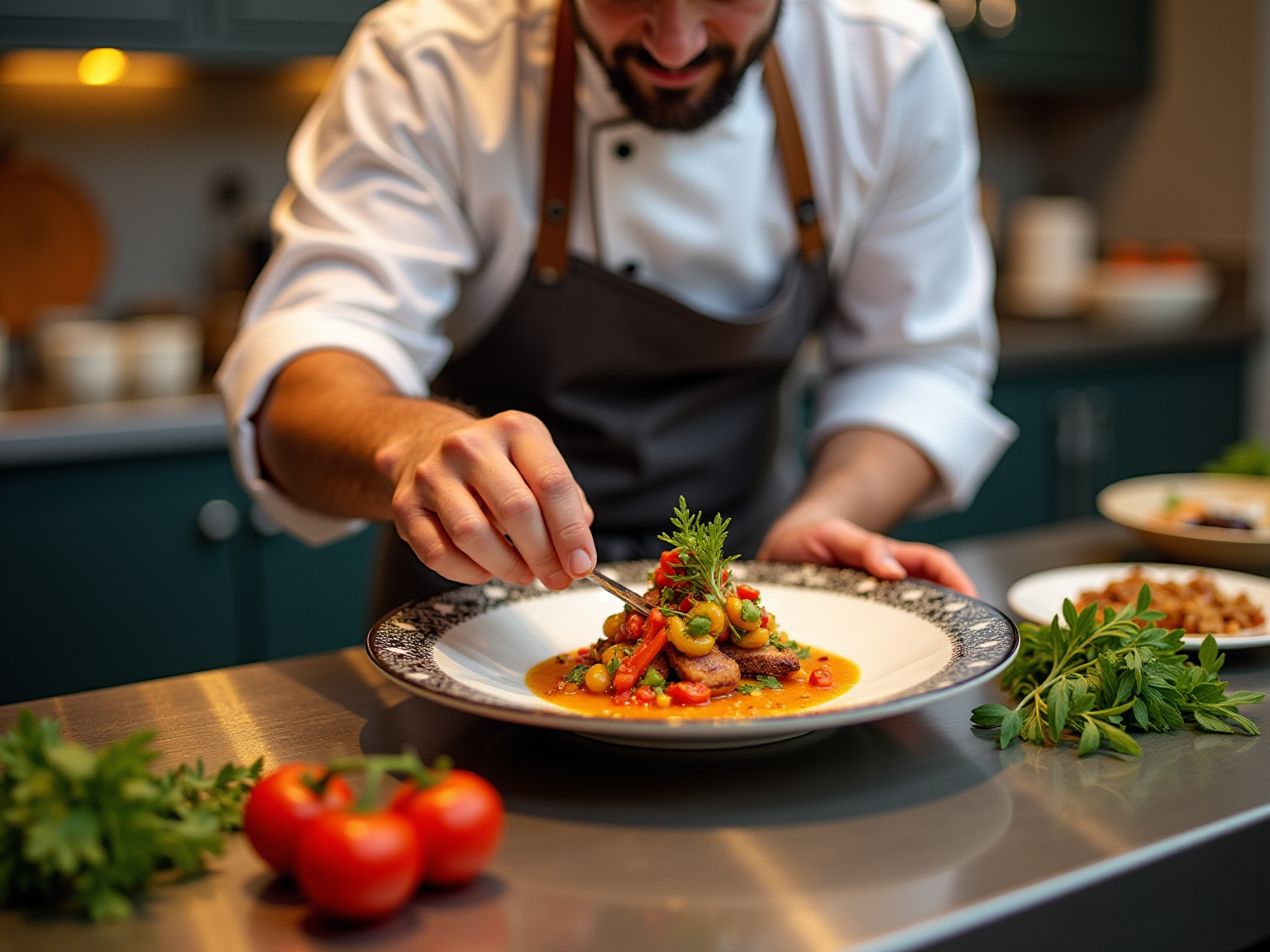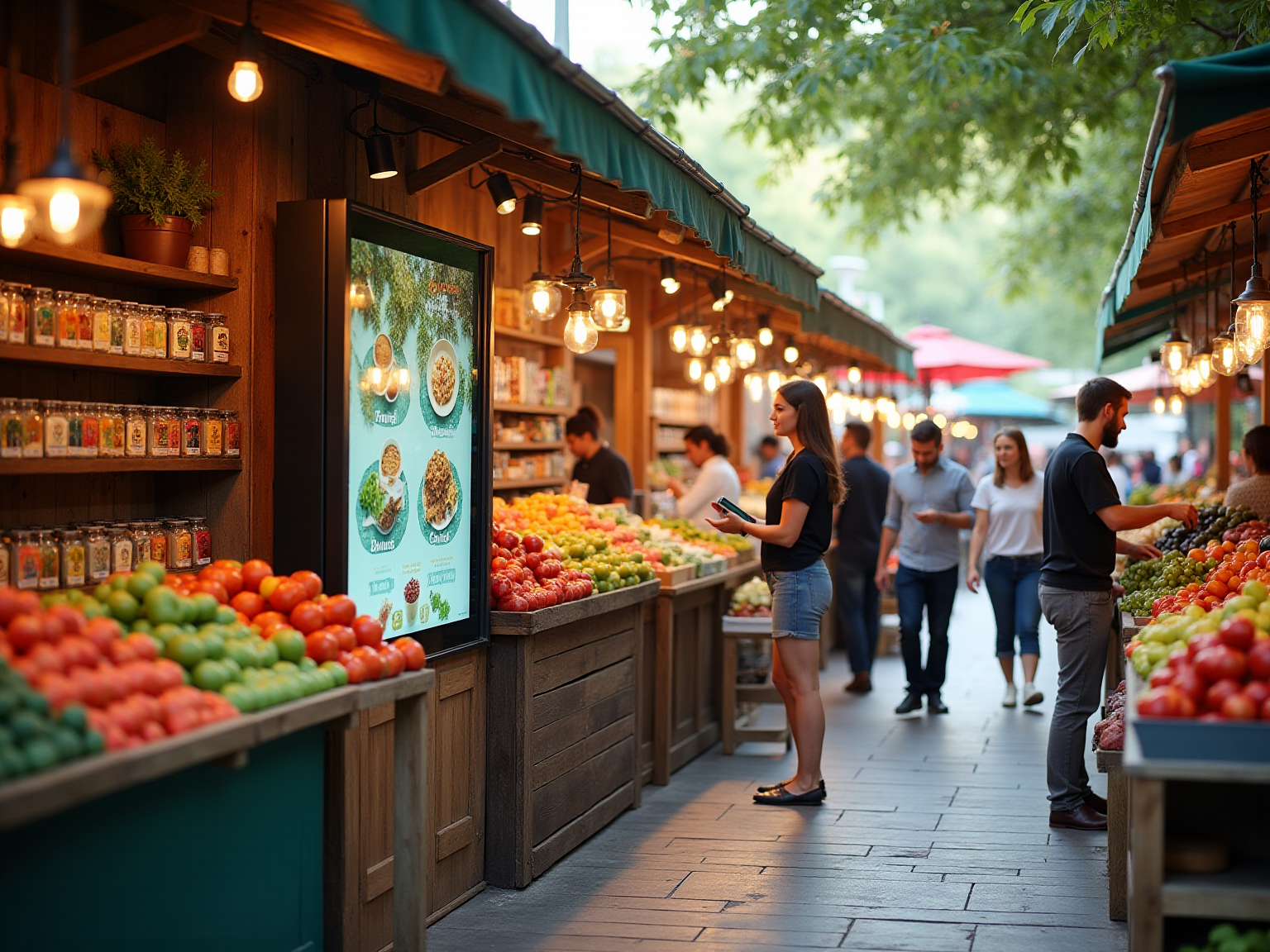Digital Branding Strategies
Best Brand Building Literature for the UAE Food and Beverage Industry
Overview
The paramount literature on brand-building within the UAE food and beverage industry underscores the critical significance of authenticity, cultural relevance, and strategic digital engagement in cultivating customer loyalty. Key texts such as ‘Building a Story Brand’ and ‘Branding that Means Business’ reinforce the necessity for clear messaging and emotional connections—elements that are essential for successfully navigating the diverse and competitive landscape of the UAE market.
Introduction
In the dynamic and diverse landscape of the UAE’s food and beverage sector, effective brand building represents a multifaceted endeavor that intricately intertwines cultural nuances with modern marketing strategies. As brands aim to capture the loyalty of both local and expatriate consumers, understanding the complex dynamics of consumer preferences and market trends becomes essential.
Central to this challenge is the imperative for authenticity and emotional connection, as brands navigate a competitive environment characterized by rapid growth and evolving consumer expectations. By harnessing the power of storytelling, leveraging digital platforms, and embracing sustainability initiatives, successful brands reveal valuable insights into cultivating lasting relationships with consumers.
With the Quick Service Restaurants segment poised for remarkable growth, the significance of innovative brand strategies that resonate with the UAE’s unique cultural tapestry cannot be overstated.
Understanding Brand Building Literature in the UAE Food and Beverage Sector
The UAE food and beverage sector thrives on a rich tapestry of market influences, seamlessly blending local traditions with global trends. Successful identity development in this diverse environment necessitates a profound understanding of the intersection between cultural values, buyer preferences, and market dynamics. The most impactful brand-building literature for the UAE food and beverage industry underscores critical themes that illuminate the essential significance of authenticity. Companies must forge connections with both local and expatriate communities to cultivate loyalty and trust.
For instance, ‘Building a Story Brand’ by Donald Miller advocates for clear messaging that resonates with customer values, a principle prevalent in the leading brand-building literature for the UAE food and beverage industry, particularly relevant in the UAE’s multicultural context. Moreover, ‘Branding that Means Business’ provides insights into the emotional connections that underpin consumer-brand relationships, which are crucial in the competitive F&B landscape of the UAE, solidifying its status as a cornerstone of brand-building literature in this sector. To navigate this intricate landscape effectively, companies must integrate efficient media planning and purchasing strategies. Recent trends indicate that social platforms significantly influence perceptions, allowing organizations to engage directly with consumers and showcase their cultural values. This engagement is paramount, as the food service sector is recognized as a vital non-oil economic driver, emphasizing the economic importance of robust marketing strategies.
The government actively promotes entrepreneurship and innovation within food-related businesses, fostering a supportive environment for product development. With the Quick Service Restaurants (QSR) segment projected to expand at an impressive 19% CAGR from 2024 to 2029, companies that adeptly leverage insights from communication and content creation, alongside strategic media planning and purchasing, will be well-positioned to seize emerging opportunities in this dynamic market.
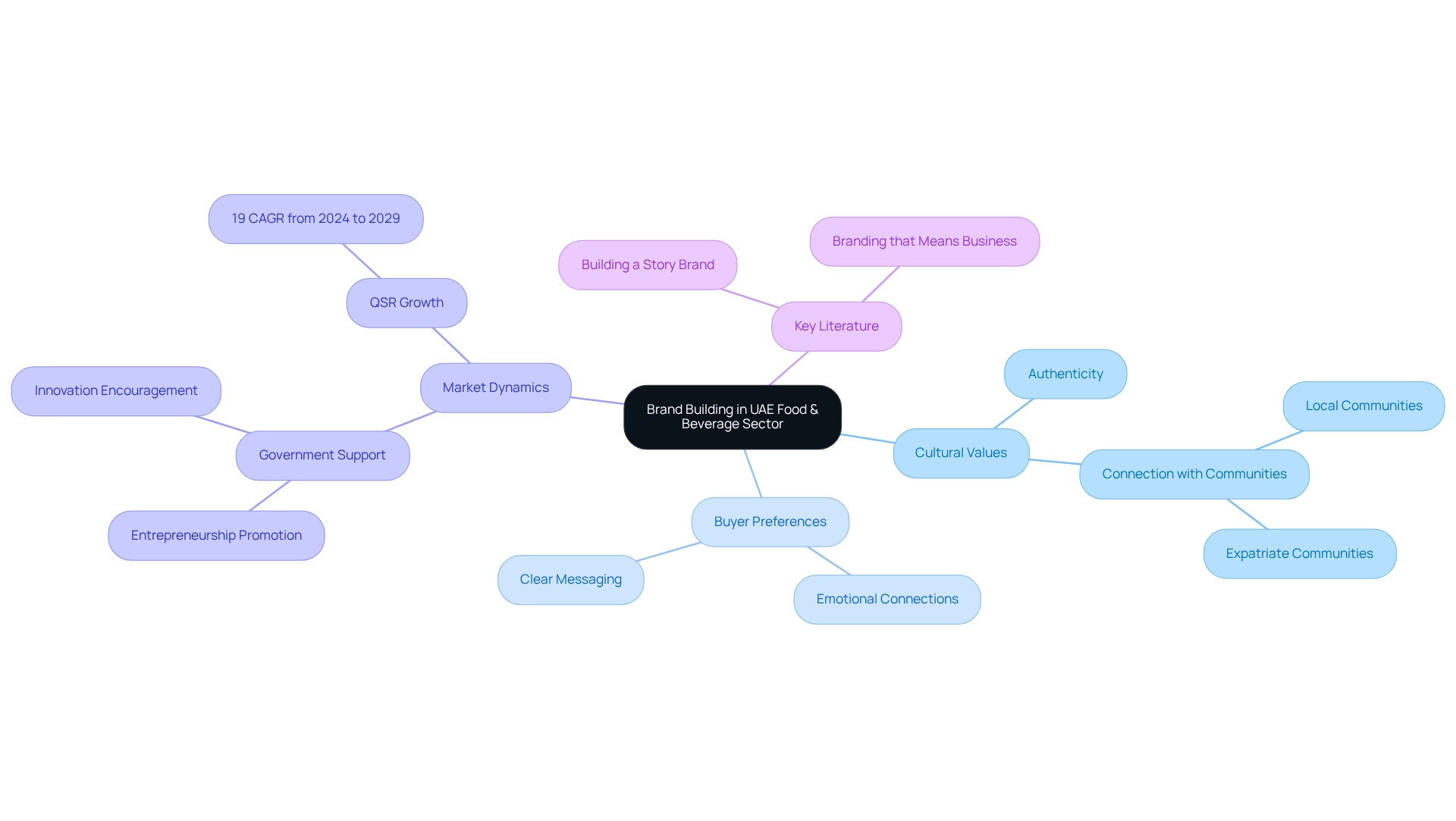
Criteria for Evaluating Brand Building Strategies
Evaluating brand building strategies in the UAE food and beverage sector requires careful consideration of several essential criteria:
-
Cultural Relevance: Strategies must resonate with local customs and values, fostering customer loyalty and connection. Brands that successfully integrate cultural elements into their messaging often see enhanced engagement and trust. For instance, the recent arrival of African Queen in Dubai illustrates how a label can merge tradition with contemporary elements to attract local buyers.
-
Customer Engagement: Effective strategies actively involve customers through interactive marketing initiatives and community participation. Involving customers not only fosters brand loyalty but also promotes word-of-mouth advertising. As noted by a client, “The depth of analysis, accuracy of data, and actionable recommendations have greatly enhanced our strategic decision-making.” This emphasizes the significance of creative marketing strategies that adjust to changing customer preferences, a fundamental element of WonderEight’s approach.
-
Adaptability: The capacity to change direction in response to industry trends and client feedback is essential for ongoing success. With the Quick Service Restaurants (QSR) sector expected to grow at around 19% CAGR from 2024 to 2029, companies that stay adaptable can more effectively maneuver through the changing environment of the UAE market, especially as dining preferences shift.
-
Digital Presence: With the UAE having one of the highest internet usage rates worldwide, a strong digital plan is essential for visibility and customer engagement. Brands must utilize social media and online platforms to connect with their audience effectively, employing innovative content creation strategies, including media planning and media buying, to engage customers.
-
Sustainability: As individuals increasingly prefer companies that show dedication to sustainability, this criterion has become essential. Brands that prioritize sustainable practices not only attract eco-conscious buyers but also improve their overall brand image.
-
New Codes of Food Advertising: Grasping and adjusting to the new codes of food advertising is essential in today’s economy. Brands must navigate these evolving standards to ensure their messaging aligns with consumer expectations and regulatory requirements.
By concentrating on these criteria, along with insights from the IMARC Group regarding market drivers, challenges, and opportunities, companies can utilize the best brand building literature for the UAE food and beverage industry to develop effective strategies that resonate with the unique characteristics of the UAE market, ultimately driving success in the competitive sector.
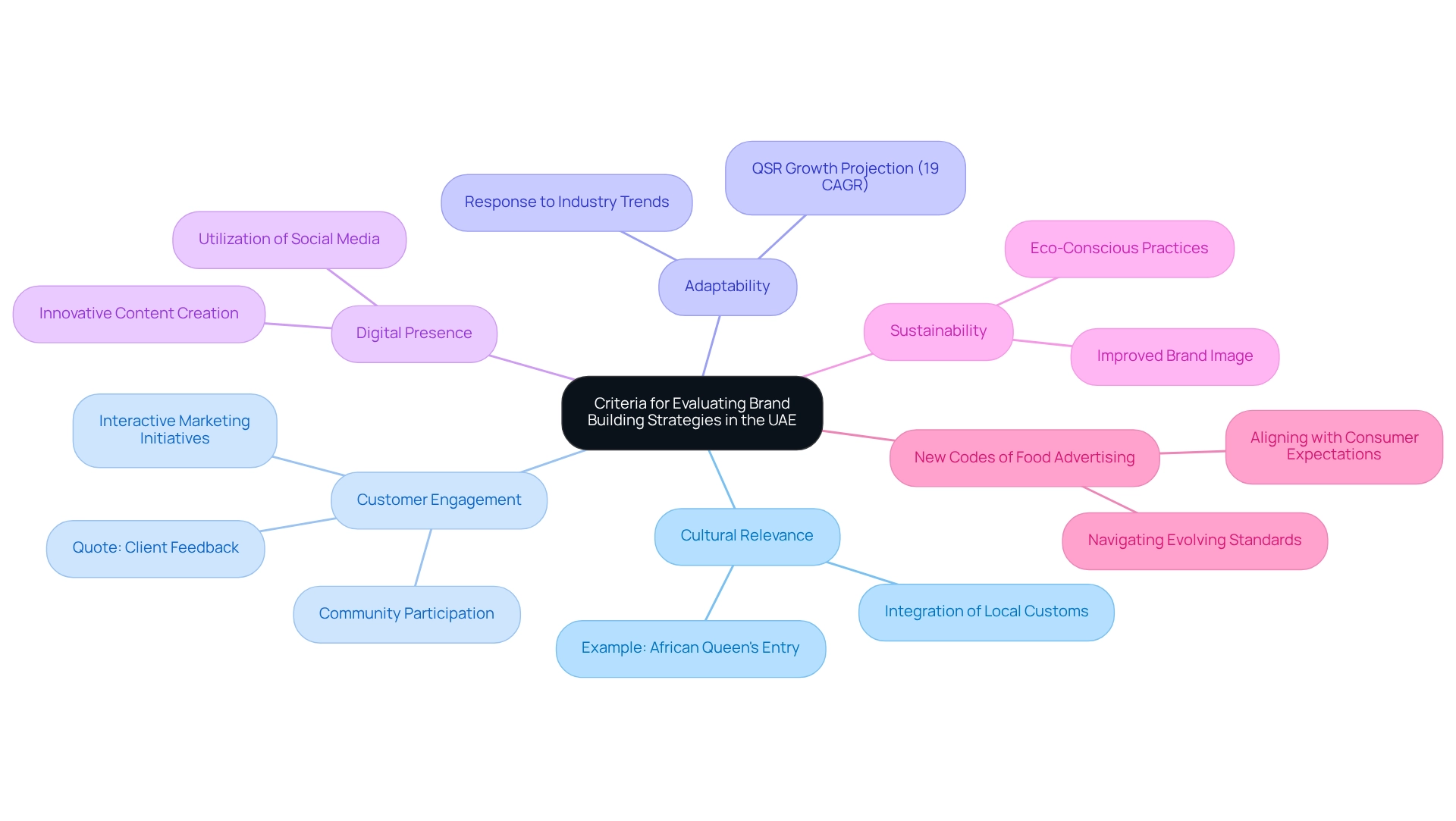
Comparative Analysis of Leading Brand Building Approaches
In the UAE food and beverage sector, several leading brand-building approaches stand out:
-
Storytelling: Brands like Al Ain Water effectively utilize storytelling to forge emotional connections with customers, highlighting their heritage and commitment to quality. This approach not only fosters loyalty but also necessitates consistent messaging to maintain authenticity and engagement.
-
Digital Marketing: Companies like Deliveroo leverage digital platforms for targeted advertising and customer engagement, allowing immediate feedback and flexible plan modifications. WonderEight’s case study on digital audits demonstrates how evaluating online presence can result in improved digital approaches, enhancing overall performance. While this approach excels in reach and engagement, it can sometimes lack the personal touch that builds deeper connections.
-
Sustainability Initiatives: Brands like Majid Al Futtaim have successfully integrated sustainability into their branding efforts, appealing to environmentally conscious consumers. This strategy enhances company reputation and loyalty but often requires substantial investment in sustainable practices and messaging.
-
Local Partnerships: Collaborations with local influencers and enterprises, exemplified by names like Jollibee, can significantly enhance credibility and community reach. This approach builds trust and fosters a sense of belonging, although it demands careful selection of partners to ensure alignment with organizational values.
-
Gamification Strategies: Incorporating gamification into marketing campaigns can enhance audience engagement by making interactions more interactive and enjoyable. This approach not only captures attention but also encourages participation and loyalty.
These strategies mirror the dynamic environment of brand development in the UAE food and beverage industry, as outlined in the best brand-building literature for the UAE food and beverage industry, where storytelling, digital engagement, sustainability, local partnerships, and gamification play vital roles in influencing perceptions and fostering brand loyalty. Notably, 73% of shoppers report that a product’s visual appeal influences their purchasing decisions, underscoring the importance of effective branding in this competitive market. As Kaspar Manz, Graphics Team Lead, states, “Level 1 hues are specific shades that should remain precisely as they are,” highlighting the significance of visual consistency in branding.
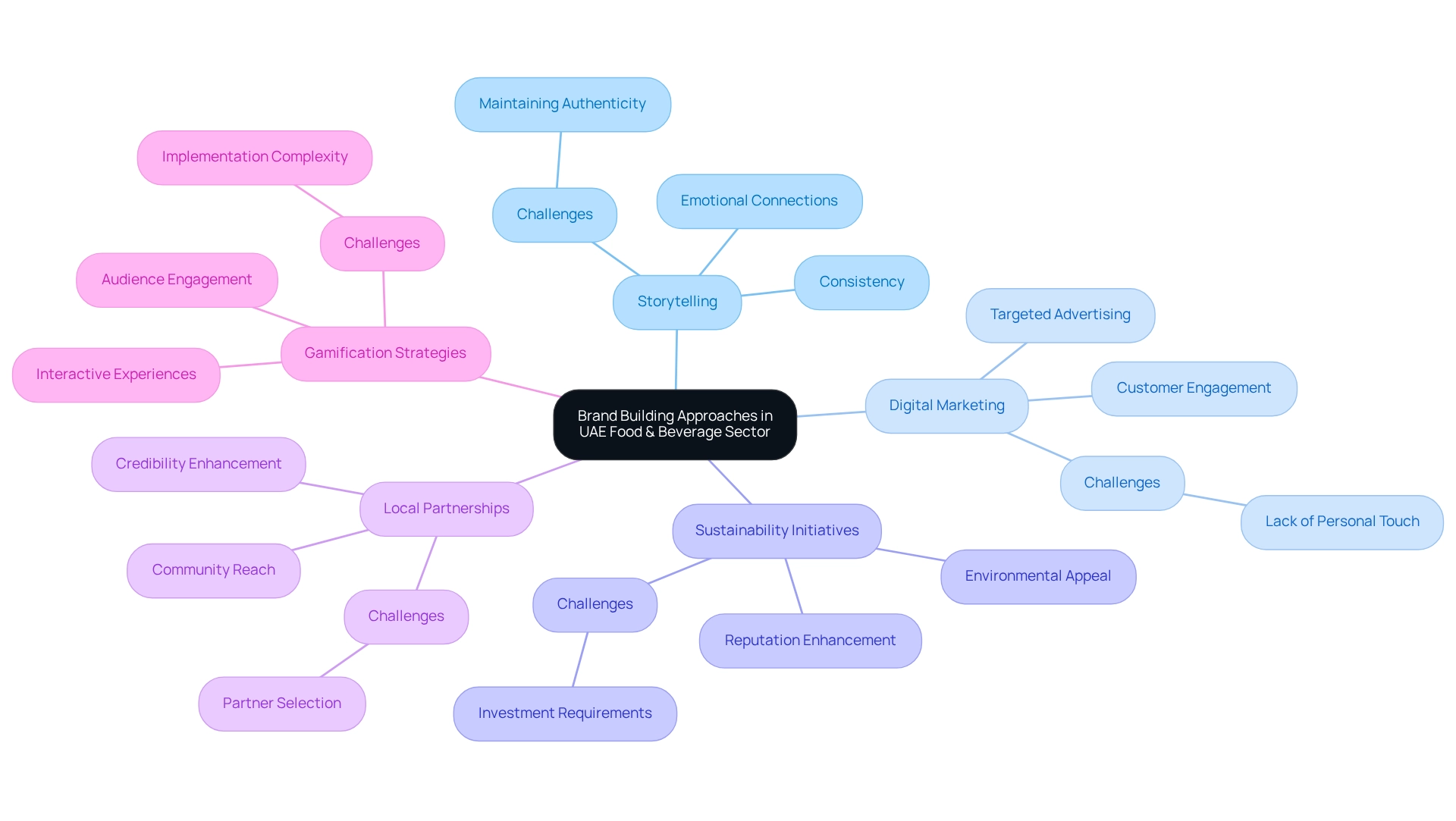
Key Takeaways and Recommendations for Brand Managers
Brand managers in the UAE food and beverage sector must prioritize the following key takeaways:
-
Embrace Cultural Nuances: Understanding and integrating local culture into branding efforts is essential for fostering resonance and loyalty among customers. This approach not only enhances brand identity but also aligns with the diverse cultural landscape of the UAE.
-
Leverage Digital Tools: Utilizing digital marketing strategies, such as social media campaigns, targeted advertising, and data analytics, is crucial for improving audience engagement. Brands should harness analytics and feedback systems to adapt swiftly to evolving customer preferences, ensuring that marketing efforts remain relevant and impactful.
-
Focus on Sustainability: Incorporating sustainable practices into marketing can significantly distinguish a company in a competitive market. With 68.3% of restaurant customers willing to spend more at establishments that prioritize sustainability, this strategy can attract a growing segment of environmentally conscious consumers. Moreover, utilizing digital tools to track and promote sustainable practices can further enhance this effort.
-
Build Community Connections: Establishing partnerships with local influencers and businesses enhances credibility and fosters community loyalty. Engaging with the local community not only enhances visibility but also fosters trust among consumers.
-
Ongoing Education: Keeping updated on industry trends and client preferences is essential for sustaining competitiveness in the dynamic UAE landscape, where independent outlets hold roughly 60% share in the foodservice sector as of 2024. With 45% of food industry operators anticipating intensified competition in the coming year, ongoing education and adaptation are key to success. The fragmented structure of the market, characterized by diverse players and ongoing consolidation through strategic acquisitions, further emphasizes the need for brand managers to remain adaptable and responsive to changes. By utilizing the best brand building literature for the UAE food and beverage industry, they can effectively navigate the complexities of the landscape, ensuring their brands resonate with consumers and thrive in a competitive environment.
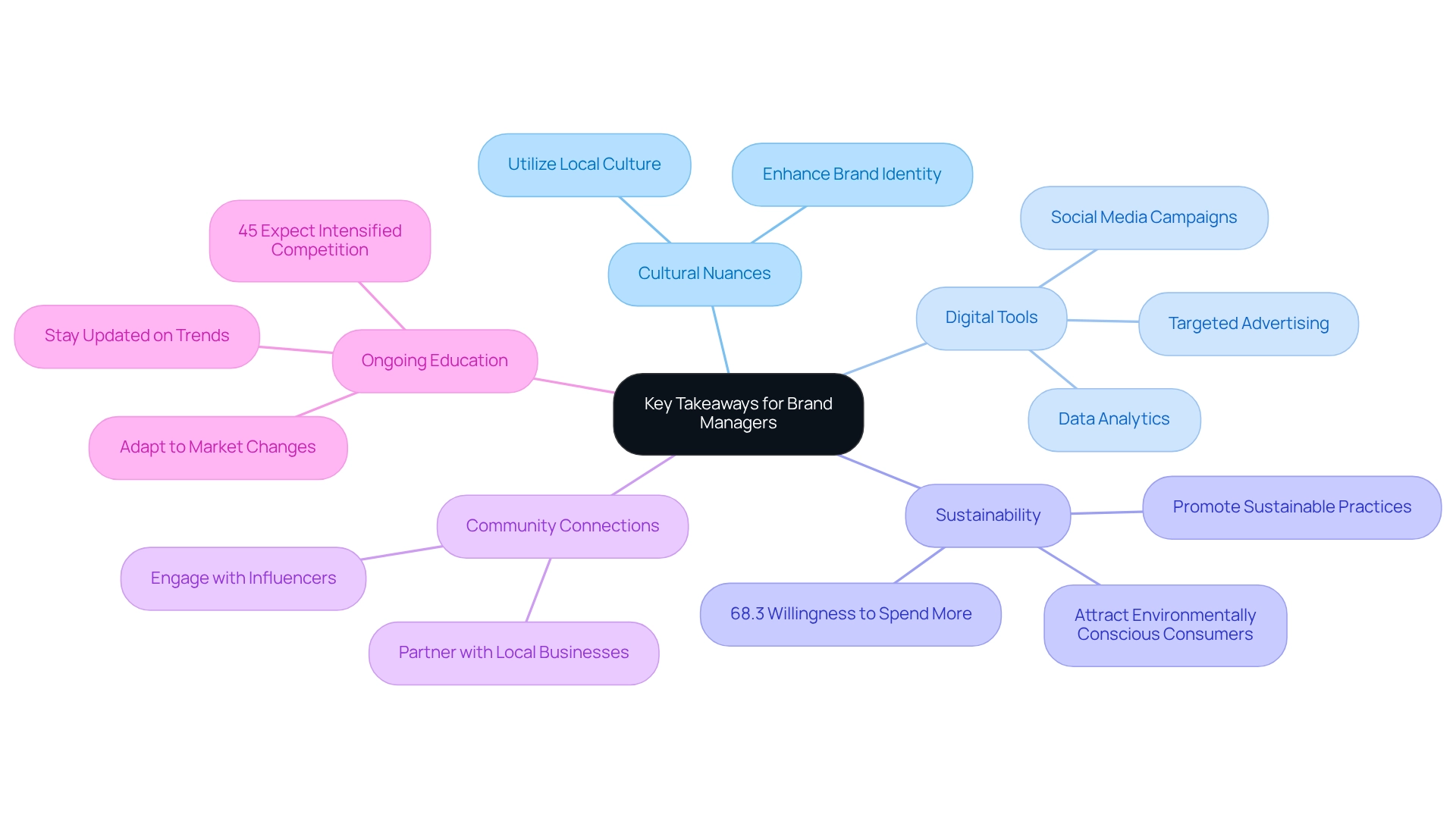
Conclusion
The exploration of brand building within the UAE’s food and beverage sector unveils a complex interplay of cultural understanding, consumer engagement, and innovative strategies. Authenticity stands as a cornerstone; brands must resonate with the diverse local and expatriate populations to cultivate loyalty and trust. The integration of storytelling, digital marketing, and sustainability initiatives not only enhances brand perception but also fosters deeper emotional connections with consumers.
Key strategies for success include:
- Embracing cultural nuances
- Leveraging digital tools
- Prioritizing sustainability
These elements are essential for brands aiming to distinguish themselves in a competitive landscape, particularly as the Quick Service Restaurants segment is poised for significant growth. Engaging with the community and forming local partnerships can further enhance brand credibility and foster a sense of belonging among consumers.
In summary, the UAE’s vibrant food and beverage market presents immense opportunities for brands willing to adapt and innovate. By focusing on the outlined criteria—cultural relevance, consumer engagement, adaptability, digital presence, sustainability, and compliance with new advertising codes—brands can navigate this dynamic environment effectively. Ultimately, the commitment to understanding and responding to consumer preferences will be pivotal in building lasting relationships and achieving success in this rapidly evolving sector.
Frequently Asked Questions
What influences the UAE food and beverage sector?
The UAE food and beverage sector is influenced by a blend of local traditions and global trends, necessitating an understanding of cultural values, buyer preferences, and market dynamics.
Why is authenticity important in the UAE food and beverage industry?
Authenticity is crucial as it helps companies forge connections with both local and expatriate communities, fostering loyalty and trust among consumers.
What are some key literature works relevant to brand building in the UAE food and beverage sector?
Key works include ‘Building a Story Brand’ by Donald Miller, which emphasizes clear messaging aligned with customer values, and ‘Branding that Means Business,’ which explores emotional connections in consumer-brand relationships.
How do social platforms impact the food and beverage sector in the UAE?
Social platforms significantly influence consumer perceptions and allow organizations to engage directly with consumers, showcasing their cultural values, which is essential for effective marketing strategies.
What is the economic significance of the food service sector in the UAE?
The food service sector is recognized as a vital non-oil economic driver, highlighting the importance of robust marketing strategies in this industry.
What is the projected growth for the Quick Service Restaurants (QSR) segment in the UAE?
The Quick Service Restaurants (QSR) segment is projected to expand at an impressive 19% CAGR from 2024 to 2029.
How can companies succeed in the UAE food and beverage market?
Companies can succeed by leveraging insights from communication and content creation, alongside strategic media planning and purchasing, to capitalize on emerging opportunities in the dynamic market.

